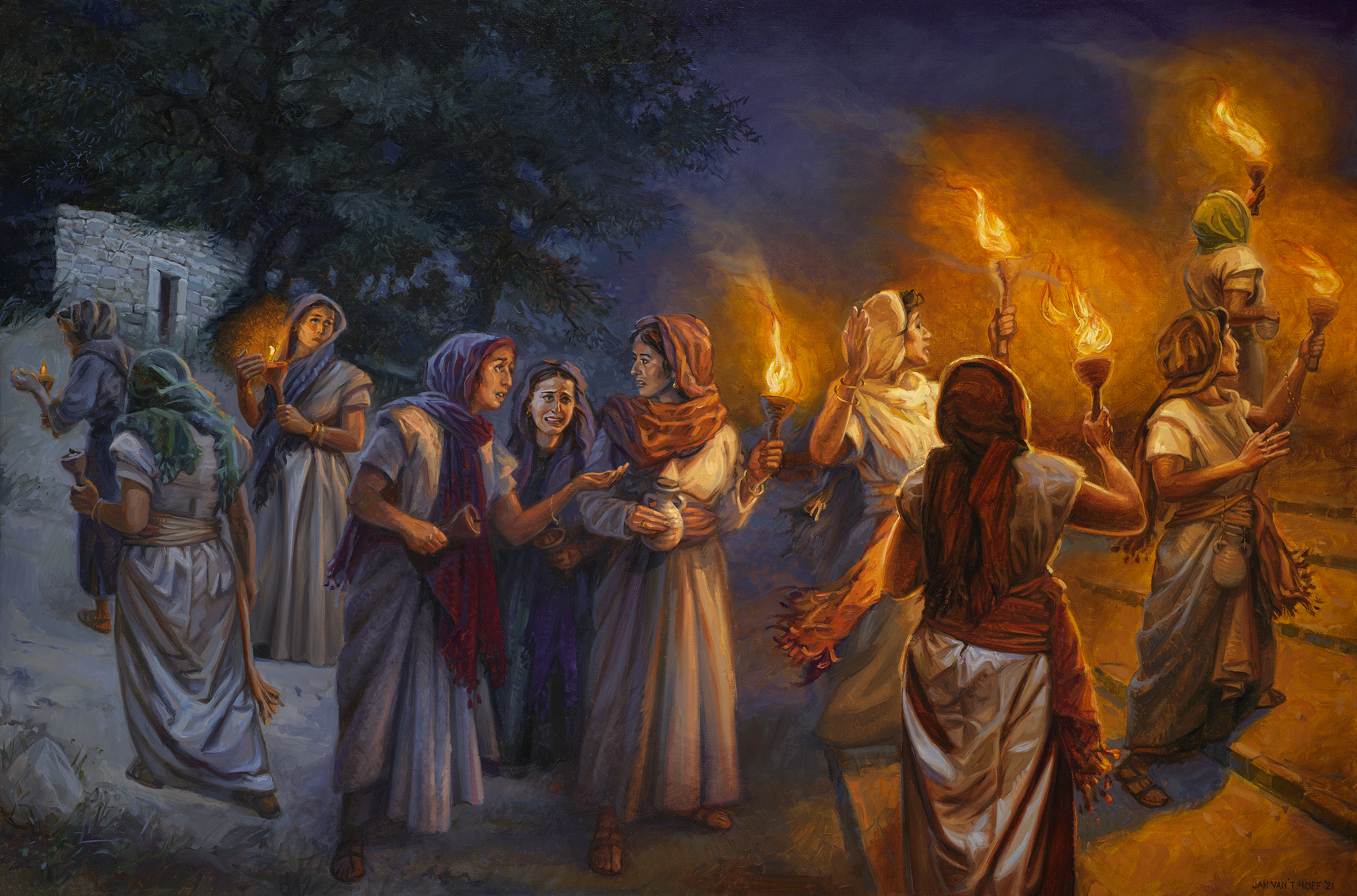The Parable of the Ten Virgins Matthew 25:1-13
The title above comes from a passage in Mark, chapter 13 where Mark describes the return of Christ. He says, after describing the destruction of the temple and the tribulation and danger that his disciples will see and experience – “So, also, when you see these things taking place, you know that he is near, at the very gates” (Mark 13:29).
The language throughout the New Testament is graphic, even disturbing. I find myself uncomfortable – just hoping (without much intent) that I will be ready. Peter says that the day of the Lord will come like a thief, “and then the heavens will pass away with a roar, and the heavenly bodies will be burned up and dissolved, and the earth and the works that are done on it will be exposed” (1 Peter 3:10). And then he asks a question in almost a nonchalant way – “Since all these things are thus to be dissolved, what sort of people ought you to be in lives of holiness and godliness, 12 waiting for and hastening the coming of the day of God?” (11, 12).
What sort of people? Our answer here will determine what sort of watchers we’ll be. I’ll be honest, I have never made the connection between my godliness and the Lord’s return. I appreciate Peter’s admonition here and I think it says more about Christ’s return than our trying to watch for the signs. Peter carries this theme through both of his letters. He’s calling the church to be holy, as God is holy; he is calling the church to be ready – even in the midst of suffering and trials. Christ is at the gates, ready to return, to take His bride to Himself – and He wants our faith to be tested in authenticity, “that even though it is tested by fire – it may be found to result in praise and glory and honor at the revelation of Jesus Christ” (1 Peter 1:7). When I think about the Second Coming my desire for an end to my own suffering and pain often eclipses my desire that all might “be found in him” (Phi 3:9)
I want to be that watchman on the tower – watching and waiting for the Redemption of the world to come in all His power and glory. I want to be numbered among the 5 virgins who were ready when the Bridegroom returned (Mat 25:1-13). I want to heed the warning of Peter in 1 Peter in 1 Peter 5:8-10 – Be self-controlled and alert. Your enemy the devil prowls around like a roaring lion, looking for someone to devour. Resist him, standing firm in the faith, because you know your brothers throughout the world are undergoing the same kind of suffering.
To pray for His coming again means we want justice not just alleviation of our own private suffering. It means we want an end to exploitation, injustice and evil. Good watching should create in us a fervor that no one should perish.
It should strengthen our hearts to meditate on what a world looks like when it’s free from sin, destruction, and injustice.
This practice of watching in Advent is formational. Fleming Rutledge asks a simple question: “what’s in those lamps?” (Once and Future King, p. 97) What makes 5 virgins ready and 5 who were not? Is it not our practices of worship, Bible study and prayer? (ibid. p. 99).
Our watching might not be merely about observing the times, but about being ready and alert, as Peter indicates. In the passage above, Peter says that the world to come is a world of righteousness, and our lives need to exhibit godliness and holiness – traits we can never attain on our own. In this same letter, in chapter one Peter tells us: “His divine power has granted to us all things that pertain to life and godliness!” (I Peter 1:3). I would say then that watching has less to do with frantically searching for the signs as much as it has to do with our abiding in Christ, our immersion in His life. May we all be like the watchmen in Isaiah 52:8:
Listen! Your watchmen lift up their voices; together they should for joy. When the Lord returns to Zion, they will see it with their own eyes.
Isaiah 52:8
In the parable of the five virgins who were ready, Matthew says – when the bridegroom came – they went in with him to the marriage feast! (Mat 25:10). And such is the kingdom of God!


Three words have stuck out to me in your Advent posts. “Prepare”. “Wait”. “Watch”. To me they all have a sense of expectancy. None are passive, even the waiting. All are intentional and all with a focus external to myself. A creature to her Creator.
I like the idea that these are not passive verbs! Even though waiting seems passive it’s not!